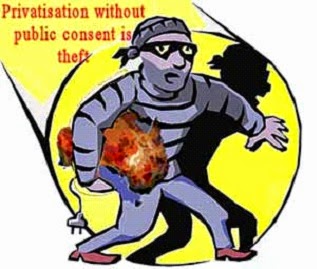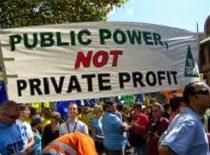Sovereign Green Global is, according to its
website, running a REDD+ conservation project, “located primarily in the Milne bay province of Papua New Guinea”. The project covers “approximately 125,000 hectares of rainforest”. But details of the project are scant and the information that is available rings plenty alarm bells.
The REDD project in Milne Bay province is supposed to reduce emissions from deforestation by protecting the forests from logging and conversion for agriculture. It will do so,
according to Sovereign Green Global, “by offering the farmers financial incentive and intact forests rather than income received from deforestation”.
Sovereign Green Global does not explain how this will prevent logging or palm oil companies from clearing the forests.
Clean Development Mechanism or REDD?
The project is listed on the
CDM Bazaar, a website run by the UN Environment Programme
as“a global ‘virtual information exchange place'” about the Clean Development Mechanism that is “open to all interested parties”.
At a first glance, the website looks like an official UN website listing CDM projects, but in fact any company can
register and post its project details on the website.
On CDM Bazaar, the Milne Bay project is described as an “Avoided Un-Planned Deforestation project”, using an “an existing CDM methodology”. The project idea note lists seven methodologies, and states that “the project falls within the category AFOLU – REDD – Avoiding unplanned deforestation and degradation (AUDD)”. That is, of course, a Verified Carbon Standard (VCS)
REDD activity, but it is not recognised under the CDM.
The
project idea note states that the project is “located in PNG and contains 58,967 ha of rainforests”. That’s less than half the area claimed on Sovereign Green Global’s website.
The project idea note states that VER credits will be available from the project from January 2014. But a page on
Facebook, titled “Carbon Trade Project”, includes a photograph of “the MOA and MOU with Sovereign Green Global Australia Ltd for the REDD Project in Mimbui land and East Collinwood Bay”. The photograph is dated February 2014:
![]()
So much for free, prior and informed consent.
Sovereign Green Global
A company called Sovereign Green Global Ltd was
registered in the UK in November 2012. The company address was 145-157 St John Street. For £49.99 per year, Companies Made Simple will register a company at this
address. Sovereign Green Global shared this address with almost
40,000 other companies.
In January 2013, Tony Adams took over as director of the company, and remained in place until the company was dissolved in June 2014.
Tony Adams is also the Chairman and Founder of Sovereign Green Global Australia Pty. Ltd., the company with the Milne Bay REDD project on its website. The company’s
website provides little information about the company, apart from explaining that,
Sovereign Green Global Australia is a global company with a network of individuals dedicated to Humanitarian and Environmental Issues.
Sovereign Green Global’s website was
registered (anonymously) in January 2013.
Green Giant Venture Fund
The project idea note explains that the REDD project in PNG is being developed by Sovereign Green Global together with the Green Giant Venture Fund.
Other than an address in Brazil and an address in the USA, Green Giant Venture Fund’s
website provides little information about the company.
There’s not much information available elsewhere, apart from a series of press releases of agreements with companies developing carbon projects. Such as
this one, in which Green Giant Venture Fund is described as follows:
Green Giant Venture Fund has expertise and experience in Carbon Credit Project (CCP) Development and provides technical, political and legal support required for the project and client. The Fund will also advise as to the strategy and tactics for effecting a forward financing by framing a strategic partnership in the Carbon financial sector and by executing a Carbon Finance option (FSCCP) aimed at capitalizing the client’s current and future (CCP).
Green Giant Venture Fund has been hired by
severalcompaniestosellcarboncredits.
Grant Galloway is the director of Green Giant Venture Fund. In 2011, Green Automotive Company hired Green Giant Venture Fund:
Green Automotive Company Corporation (OTC:GACR) announced today the engagement of Green Giant Venture Fund as part of the Company’s plans to sell forward it’s expected allocation of carbon credits generated by future sales of it’s zero emission, All-Electric vehicles through the developing “Cap and Trade” commodity market.
You can read more about this on seekingalpha.com,
here and
here. Galloway appears in the second of those links.
Today, there is no mention of either “carbon credits” or “Green Giant Venture Fund” on Green Automotive Company’s
website.
Green Giant Venture Fund’s website includes this statement about carbon credits (emphasis added):
Buyers have five reasons to purchase carbon offsets. They purchase carbon offsets for compliance to regulated markets, pre-compliance to regulated markets, investing for a financial return, carbon neutral product offsetting, and public relations.
The bit about investing in carbon credits “for a financial return” sets off
more alarm bells.
Green Giant Venture Fund’s website lists the PNG REDD project and states that,
PDD [Project Design Document] is currently under development and is 90% completed. Estimated at 48m VCU credits with possibility of moving to Gold Standard.
The Milne Bay project idea note includes the Gold Standard’s logo at top of each page, suggesting a little more than the “possibility of moving to Gold Standard”. I’ve written to the Gold Standard to check whether Sovereign Green Global obtained the necessary
permission before using the Gold Standard trademark in this way.
UPDATE – 18 September 2014: REDD-Monitor received a response from Lisa Rosen, the General Counsel of The Gold Standard Foundation, shortly after this post was published. “Sovereign Green Global’s alleged REDD project in Milne Bay is not a registered Gold Standard project,” Rosen wrote. “The use of The Gold Standard logo by Sovereign Green Global in the Project Idea Note is not authorized and is, therefore, illegal.”
Astra Resources
In March 2014, a UK-based mining company called Astra Resources PLC
announced that it had signed an agreement with Sovereign Green Global, under which Sovereign Green Global would provide €20 million “equity capital injection” followed by €780 million in “equity capital, knowhow and assets”.
Sovereign Green Global’s Tony Adams
said,
“As Chairman and Founder of Sovereign Green Global Australia I fully support Astra Resources and its endeavours to create a cleaner and more sustainable environment for future generations. Sovereign will invest substantially in developing this new technologies [sic] and will now make a further commitment of carbon credits to the ongoing process of the green energy solutions that Astra are developing.”
The
Australiandescribes the deal as “particularly curious”, and notes “that there appears to be no evidence that [Soveriegn Green Global Australia] has the capacity for multi-million-dollar financing deals”.
By a strange coincidence, Astra Resources’ registered
address is 145-157 St John Street, the same address as the UK version of Sovereign Green Global.
In 2013, a former director of Astra Resources
told the
Australian that a document that the company used to raise up to US$45 million from Australian retail investors contained “significant misleading and false statements”. The Australian reports that,
Among those statements was a claim that Astra Mining was looking to raise €1 billion ($1.42bn) via an initial public offering on the Frankfurt Stock Exchange, of which $700m had already been committed by major Korean and US investors.
Which sounds strangely similar to the deal with Sovereign Green Global.
Astra Resources’
press release states that,
SGGA [Sovereign Green Global Australia] are currently in the process of completing projects in the following areas and they are PNG Milne Bay, Philippine Province of Negros, and Vanuatu. These three areas specifically relate to over 200 million REDD+ Credits. These credits are at the stage of certification and will be settled over the next few months. The credits will be warehoused with a major investment bank and a line of credit will be allotted to SGGA.
In May 2014, the Australian Securities and Investment Commission (ASIC) started
legal action against Astra Resources PLC and its directors.
On 4 June 2014, Astra Resources was suspended from the European Share Trading Exchange GXG Markets. Here’s how GXG Markets
explains the suspension:
The Company is currently under suspension for supplying inaccurate information that was required as a condition to move up from the GXG First Quote to the GXG Main Quote market and has previously been suspended for corporate governance failings in relation to filing accurate information to Companies House (UK) in a timely fashion.
On the same day, Astra Resources
announced that it has “taken a very significant position in the carbon reduction market on its balance sheet in exchange for 270m Euros of scrip”. (Scrip is
a substitute for legal currency– outside the company it is worthless.)
The carbon reduction benefits are from the management of tropical rainforests at a country level throughout the Asia Pacific region. Astra’s partners have negotiated country level agreements, and are using an internationally recognised financial registry, as well as the most experienced science teams in the region.
So it appears that Sovereign Green Global has sold carbon credits from three REDD projects (that may or may not exist) to Astra Resources (a company facing legal action and that has been suspended from GXG Markets) for scrip (which is worthless outside Astra Resources).
SOURCE: REDD-MONITOR.ORG



















